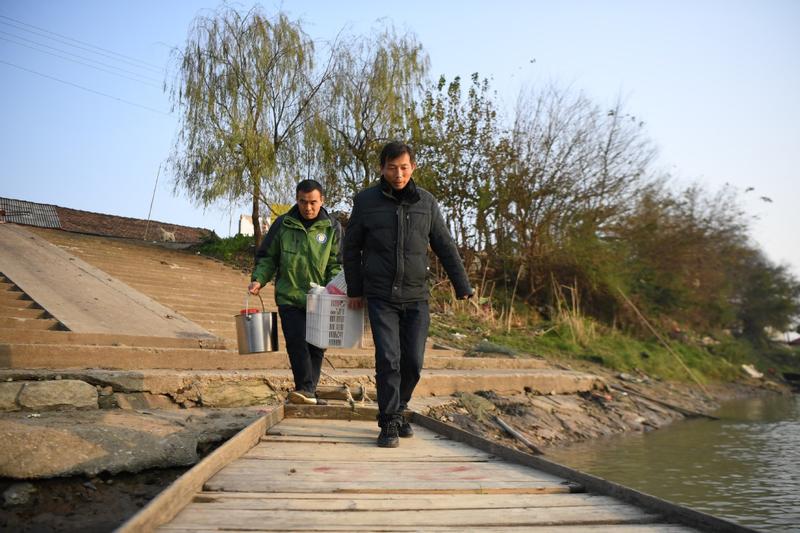 In this undated photo, ex-fisherman Shi Zhongfang (front) helps a relative move daily supplies ashore in Yuanjiang, Hunan province, in December, 2020, as they bid farewell to fishing in Dongting Lake. Shi is now a restaurateur serving authentic fisherman-style cuisine. (XUE YUGE / XINHUA)
In this undated photo, ex-fisherman Shi Zhongfang (front) helps a relative move daily supplies ashore in Yuanjiang, Hunan province, in December, 2020, as they bid farewell to fishing in Dongting Lake. Shi is now a restaurateur serving authentic fisherman-style cuisine. (XUE YUGE / XINHUA)
Pi Peiqi, 58, has fished Dongting Lake since he was a teenager, but his life changed dramatically after a fishing ban took effect more than a year ago.
His family owned two boats-one for accommodation, the other for fishing. "Those who live on the mountains live off the mountains; those who live near water live off the water," Pi said.
A complete 10-year fishing ban to protect the biodiversity of the Yangtze River started on Jan 1. In recent years, bans have also been introduced by local governments along the Yangtze to speed up environmental protection work.
READ MORE: 10-year Yangtze fishing ban comes into effect
To ensure the livelihood of the 231,000 fishermen affected by a 10-year fishing ban to protect the biodiversity of the Yangtze River , the government has taken measures to help them find employment, according to the Ministry of Agriculture and Rural Affairs
China attaches great importance to environmental protection along the 6,300-kilometer river as well as the high-quality development of the Yangtze River Economic Belt, which covers nine provinces and two municipalities and accounts for more than 40 percent of the country's population and economic output.
In late 2019, Pi left his boat home to live with his son in Jiahe village, Yuanjiang, Hunan province, before the local government implemented a 10-year fishing ban on Dongting Lake.
He was offered a job by local authorities patrolling and protecting the lake and earns more than 2,000 yuan (US$310) a month. In the past, some areas of the lake became inundated with garbage, and environmental protection was not high on fishermen's agendas, he said.
"My job now is to patrol and collect garbage in the water where I used to fish, and the environment has seen a notable improvement since the fishing ban was implemented," he said.
To ensure the livelihood of the 231,000 fishermen affected by the ban, the government has taken measures to help them find employment, according to the Ministry of Agriculture and Rural Affairs.
Before the end of last year, the central government allocated 9.2 billion yuan and local governments 11.4 billion yuan to financially support affected fishermen.
As of Dec 11, a total of 218,000 former fishermen were enrolled in social welfare programs and 165,000 had found new jobs, the ministry said.
READ MORE: Many ex-fishermen now protect Yangtze River
Liu Kehuan, a former fisherman in Hunan's Hanshou county, took the leap from his old job earlier than others. In July 2015, he gave up fishing and established the West Dongting Lake wetland protection association.
The association has more than 400 volunteers and around 70 percent are ex-fishermen, said 55-year-old Liu.
Apart from being the head of the association, Liu also raises chicken and crawfish on a farm.
He said fish numbers in the lake had declined rapidly in recent decades due to overfishing, dredging and pollution. Some fishermen even resorted to oversized nets and electrofishing, he said.
The association's main task is to collect garbage on the lake and look out for illegal fishing and unlawful wastewater emissions from chemical plants, Liu said.
Over the past five years, from November to March, volunteers also protected migratory birds from being poisoned and killed, he said, adding that the association collects hundreds of kilograms of garbage every day.
"Dongting Lake is home to us fishermen. We stopped fishing to protect our home," Liu said.
Contact the writers at zoushuo@chinadaily.com.cn


